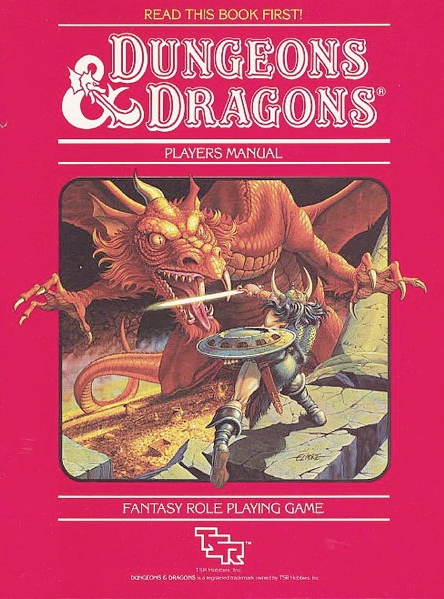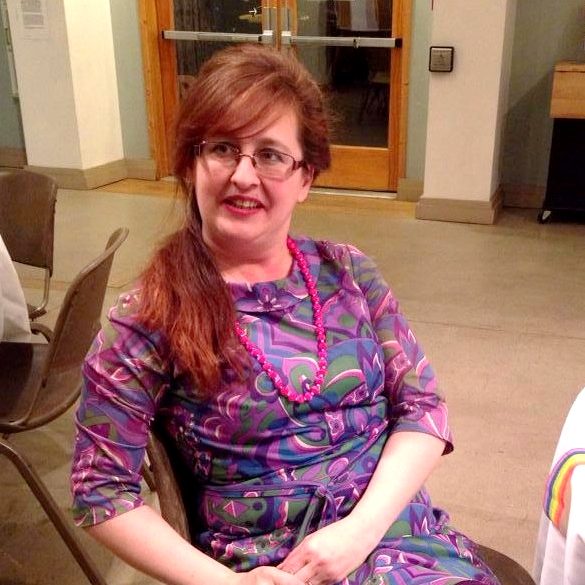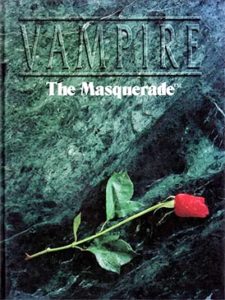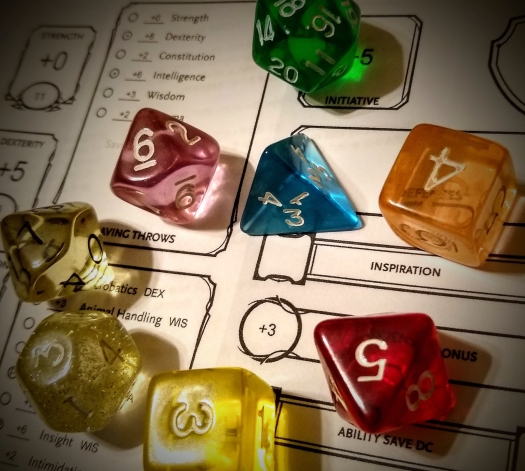I have a long and complex personal history with Role-playing Games (RPGs). I started playing Dungeons & Dragons (D&D) in high school with a boyfriend. During the time I was dating him, he used elements of gaming as one of several methods of manipulation and psychological abuse. Further in, the abuse turned physical. I came out of that time with very few memories of actual game play. I remembered the characters I created and minimal mechanics of how to play. I also came out of the experience with understandably mixed feelings about gaming, role-playing of any kind, along with so much other baggage that mixed together in a crazy anxiety stew.

I’ve always loved all the elements that led to the creation of Dungeons & Dragons and other RPGs. I’ve been a Tolkien fan practically since birth. Fairy tales, fantasy, and science fiction have been my go-to genres since before I could read at all. I was ever the child who believed in fairies. As an adult, I still do. My childhood was filled with games of pretend and imagination. Role-play was already second nature long before I knew D&D existed in its own right. I love character creation, story building, fantasy art—I was built hard-wired for RPGs. But that intrinsic quality was corrupted in the blink of an eye for me.
Many of my friends have always been gamers. They’re my tribe. So, in my 20s, when I still could not feel safe participating in game play, I sat in on sessions with my friends. I sketched while watching and listening to their stories grow through the games they played.
I enjoyed the atmosphere, even though it felt too scary to join in. The visions they conjured as they played fed my imagination and my art. I felt certain I would never play again, though I’d held onto my original set of dice, and still have them to this day. They’re colorful, sparkly, and they still feel good to hold and to look at with the light shining through them. And I guess some part of me refused to fully admit defeat. I had a tiny spark of hope that I might someday use them again.

A few years ago, I saw light shining into “self-inflicted” darkness. But I should point out that I am fully aware that the trauma was never my fault. Yet I had continued to hide from something I knew I’d probably enjoy, thus creating an entirely self-made prison. The timing might finally be right, after more than 25 years since I left the boyfriend and his abuse behind.
I’d known from before we started dating that Zen and his husband were gamers. I tuned out his gaming stories because I couldn’t face this thing I wanted to do, but felt I couldn’t do. My husband also enjoyed gaming when we first married. I sat in on their games, too, but everyday life had taken us away from that experience, so he had not gamed for maybe 10 years or more.
I felt scared and intimidated at the thought of trying to learn a new thing. I fought off panic and anxiety I had always felt around gaming, especially when adding up the numbers quickly, and under perceived pressure. When I feel anxious or triggered, my brain can’t do any of the things that should come easily. That condition kind of compounds any other fears or anxieties already present.
One day Zen told me how much his husband, Paul, loves sharing his love of gaming with newbies. He loves teaching new people how to play. He has infinite patience with the often-clumsy newbie. I tentatively reached out and asked if we could try it to see if I could do this again.

Paul chose a game system that only uses d10s (10-sided dice). That simplified everything and reduced the pressure and anxiety by at least half for me. The game was Vampire: The Masquerade.
At first, just the four of us played, with Paul as the storyteller, or game master (GM). Keeping the group very small gave me a sense of safety as I learned. Once I began to feel more secure in my role and in my skills, we added a few more friends to our group. Then we explored other systems using d20s and all the other dice, too. I still get anxious and stressed at the beginning of a gaming session, but I can feel even that easing up little by little with every new session.
We’ve been playing for about three years together now, and I look forward to gaming no matter what system we’re playing. I know that if I begin to fall, my group will catch me and show me the way back to where I need to be, with patience and love and lots of fun. Gaming has provided a creative outlet, therapeutic benefits, new ways to apply my own creativity, new friends, new ways to interact with friends and strangers alike, and more opportunities for growth with every session.
And an ongoing obsession with shiny, sparkly, colorful dice! I still use my original dice, too. Only now I have several other sets, despite some guy at a local gaming store questioning my choices in dice purchasing. Sad customer service aside, I’m certain one can never have too many dice sets . . .
When social distancing was in place due to Covid, I battled my difficulties with technology. At that time, we gamed through Discord with digital dice apps. I find technology challenging, daunting, and stressful. But I didn’t let that stop me.
It may not seem like such a big thing to most people. Gaming is even regarded as ridiculous and frivolous to some. But to have reclaimed that piece of myself in this way has been profoundly empowering. To have friends and lovers who cared enough to help me reach this point makes me feel wealthy beyond measure. My gratitude for this gift is limitless.
Manderley Swain is an artist, blogger, “sewist,” and writer from East Tennessee. In 2020, she was a costume designer with a sewing studio for over 10 years. Now, she lives the best creative life possible on her own terms. Her favorite medium is watercolor, but she dabbles in all sorts of creative pursuits. She is a creative catalyst who loves to inspire and teach others to find their inner artist. Artwork by Manderley and her partner, Zen, can be found on their website: Zenderley.
**Featured image by Manderley Swain showing her dice collection (cropped to fit)
If you (or a loved one) are involved in an abusive relationship, please seek help from The National Domestic Violence Hotline:
- Call 1-800-799-SAFE or text “START” to 8878
or call your local domestic violence shelter.

Thank you for sharing your inspiring story, Manderley. I hope it will be an encouragement for others who struggle to overcome the damage caused by physical, psychological, and emotional abuse.
Thank you for your kind words. I hope so too. Healing is a long and winding road.